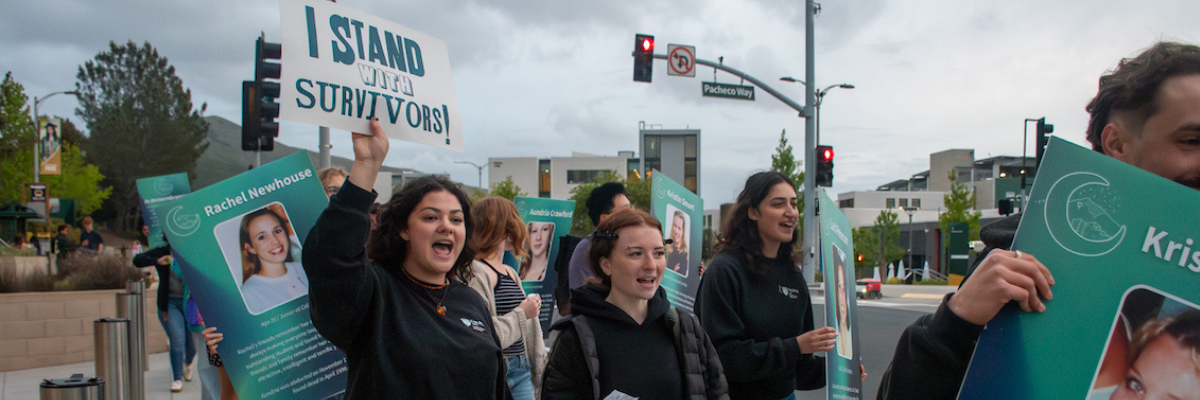Safer is Cal Poly's prevention education & confidential advocacy resource for sexual assault, intimate partner violence, domestic violence, stalking, sexual exploitation and harassment.

Located within Campus Health and Wellbeing, Safer offers holistic services to the entire campus community regarding gender- & power-based violence. Our Advocacy Staff supports survivors of violence (and their loved ones) directly, by offering confidential crisis support and advocacy, which includes crisis intervention, accompaniments, assistance connecting to resources, and more. Our Prevention Education Staff engages the campus community in setting pro-social behavior norms and encouraging community accountability to prevent the violence from occuring.
Gender- & power-based violence affects everyone differently, and those who hold marginalized identities may face additional barriers in seeking support. Safer welcomes people of all identities and backgrounds to utilize our services and is committed to ensuring our office is inclusive and accessible.
Contact Us
Email: safer@calpoly.edu (monitored by confidential advocates)
Phone: 805-756-2282
Instagram: @calpolysafer
Academic Year Office Hours:
Monday - Friday 8:30 a.m.-5:00 p.m.
Advocacy Services Location:
Health Center, Building 27
Prevention Education Office Location:
University Union, Building 65, Room 217
Make an appointment:
safer.calpoly.edu/appointment

Resources
Confidential Support: Campus Advocates
Campus Advocates (also called sexual assault and/or domestic violence counselors) are confidential and available to assist victims & survivors of intimate partner violence, sexual assault, harassment, stalking, and exploitation and any forms of gener/power-based violence. There is no threshold to receive advocacy services. Whether the violence is recent or not, Safer advocates can help navigate your experiences and connect you to the appropriate resources.
Note: Communications with Advocates are protected by state law per California Evidence Code Section §§1035.
Campus Advocates can assist in many ways, including by providing the following:
- Confidential, non-judgmental support
- Information about rights and options to help someone make an informed decision
- Help with reporting sexual assault to law enforcement which includes in-person accompaniments to the police station (the same support is also available for those that report sexual misconduct to the Title IX office)
- Information and accompaniments to sexual assault forensic exams (SARTs) and other medical options
Note: If a campus-based Advocate cannot be reached, you may contact a community-based sexual assault/rape crisis center for immediate assistance. Community-based sexual assault counselors/advocates are available 24 hours a day, 7 days a week, by calling a hotline.
Cal Poly SLO Campus Advocates
|
|
Campus-Based |
Community-Based |
|---|---|---|
|
Department/Organization |
Cal Poly Safer |
Lumina Alliance |
| Contact Information |
Phone: 805-756-2282 |
24-Hour Hotline: 805-545-8888 |
| Location |
Advocacy: Health Center, Building 27 Prevention: University Union, 65-217 |
51 Zaca Lane, Suite 150 San Luis Obispo |
| Hours |
Monday - Friday 8:30 a.m.-5:00 p.m. |
24/7 |
| Website | luminaalliance.org |
National Sexual Assault Hotline
Hotline staff is available 24 hours a day, 7 days a week via a national sexual assault hotline. Hotline staff can be contacted via phone at (800) 656-4673, or online chat at their website, www.rainn.org.
- Please note - when calling the hotline your call will be directed to a local provider based on the area code of the phone number you are calling from. If you are geographically located in an area different than the area code of the phone number you are calling from, hotline staff can still offer you support but may not have information regarding resources in your location. If this is your situation, please call the 24/7 hotline at the sexual assault/rape crisis center nearest you.
Additional Options for Support: Additional resources for support are available and include but are not limited to, mental health counseling and psychological services on-campus or community-based, your campus Title IX office, and the CSU's employee assistance program (EAP) are also available.
Immediate Medical Care
It's okay if someone does not wish to file a police report or get a sexual assault forensic exam. That said, depending on the nature of the assault, it may still be important to obtain medical care to address potential injuries, exposure to sexually transmitted infections (STIs), or if there may be risk of pregnancy. An Advocate can help explore all of the the options available to you, and address issues such as payment for medical care and confidentiality.
Note: Emergency contraceptives are also available at local pharmacies without prescription.
Options for Medical Care
| Sexual Assault Forensic Exam
Location: Confidential |
|
Campus Health & Wellbeing Location: Building 27, upstairs |
|
Sierra Vista Regional Medical Center Location: 1010 Murray Ave, San Luis Obispo, CA 93405 |
|
Planned Parenthood Location: 743 Pismo St, San Luis Obispo, CA 93401 |
Note: Per California Penal Code §§11160, all medical providers in California are required to notify law enforcement when they are treating an injury caused by “abusive or assaultive" behavior. This means that a healthcare provider may need to make a police report if their patient discloses that the injury they are seeking treatment for was caused by abuse or assault. The victim/survivor, however, has the right to not speak to law enforcement or share additional information.
A sexual assault counselor/advocate can help navigate any potential report made by a medical provider. For example, if someone does not wish to report to law enforcement, the counselor/advocate can help say no to a police report without feeling intimidated.
Evidence Collection
Sexual Assault Response Team (SART) Exams
(also known as “rape kits")
SART Exams could be used to collect DNA evidence if the assault occurred within 120 hours. Specialized sexual assault nurse examiners collect samples from a victim/survivor that may contain DNA evidence to help a potential prosecution.
A victim/survivor has the right to have a support person & advocate with them during the exam and retains the right to say no to any part of the exam.
If a person decides they want a SART, the sexual assault counselor/Advocate can provide more detailed information about options and help coordinate response with police and the SART nurse.
There are two types of exams: Restricted SARTs and SARTs
| RESTRICTED SART |
SART |
|
|---|---|---|
|
Report Requirement |
Does not require police report. |
Requires police report |
|
Who Helps Access Exam |
This option is available through your Campus Advocate as well as your local sexual assault/rape crisis center. |
This option is available through your Campus Advocate as well as your local sexual assault/rape crisis center, or a police officer. |
|
Who Are Exams For |
These exams may be appropriate for those that are not ready to speak to and involve law enforcement but want to allow for the collection of evidence. Evidence from Restricted SARTs in California must be preserved for two years in the event that a victim/survivor does want to engage with law enforcement. |
These exams are appropriate for those that would like immediate law enforcement involvement. Evidentiary exams are intended to collect forensic evidence for use in criminal prosecution. An evidentiary exam is an option available by filing a report with law enforcement. |
|
Level of Police Involvement |
Police officers will not take a report and should not engage with the victim/survivor. However, the police department will collect the evidence kit and store it until (and if) the victim/survivor decides to file a police report/criminal charge.
|
Police officers may:
|
Note about at-home rape kits: Although well-intentioned, evidence from at home “rape kits" may not be admissible for evidence.
Preserving clothing with potential DNA evidence:
Necessary evidence could be present in the clothes someone wore during the assault — this evidence can be preserved by being stored in paper bags (mold grows in plastic bags.) If the person decides to file a police report or obtain a sexual assault forensic exam (SART), the clothes can be provided to them for evidence collection.
More information about sexual assault forensic exams:
https://www.rainn.org/articles/rape-kit
Other Evidence
A sexual assault forensic exam is one way to preserve evidence, but it's not the only way. Here is a list of other evidence that can be preserved:
- Video – from door cameras, surveillance cameras, social media posts, etc.
- Names of people that may have information such as:
- Eyewitnesses – people who saw behavior or level of intoxication before the assault or witnessed the assault
- Outcry witnesses – people you told about what happened
- Any messages or communication with the perpetrator, including voicemails, texts, email and social media messaging (taking screenshots can be helpful)
- Information/documentation about or photos of injuries
- Receipts – showing where you were or what you were doing
Law Enforcement
A law enforcement officer can take a report, help access confidential support, and provide access to medical care after a sexual assault. Police departments are available for response 24/7.
Sexual assaults can be reported at any time (immediately following, days or years after the incident). Statutes of limitations vary, depending on the type of crime/sexual assault and by state. The evidence available, investigations and treatment options may also be impacted by the length of time that has passed since the assault. A sexual assault counselor/advocate or law enforcement can provide you with specific information related to these factors.
Deciding to report a sexual assault to law enforcement is a very private a personal decision. It’s okay to report to the police, not report, or not knowing if one wants to report. A sexual assault counselor/advocate can provide all information about reporting options so the victim/survivor can make an informed decision.
| Cal Poly Police | San Luis Obispo Police | |
|---|---|---|
| Coverage Area |
Incidents that occurred on-campus |
Incidents that occurred in community surrounding campus |
|
Contact Information |
Phone emergency: 9-1-1 805-756-2281 |
Phone emergency: 9-1-1 805-781-7317 |
|
Location |
Building 36 |
1042 Walnut St, San Luis Obispo, CA 93401 |
|
Hours of Operation |
Monday-Sunday 24 hours a day |
Monday-Sunday 24 hours a day |
|
Website |
afd.calpoly.edu/police |
https://www.slocity.org/government/department-directory/police-department |
More information about reporting sexual assault to law enforcement:
https://www.rainn.org/articles/reporting-law-enforcement
https://www.rainn.org/articles/communicating-law-enforcement











